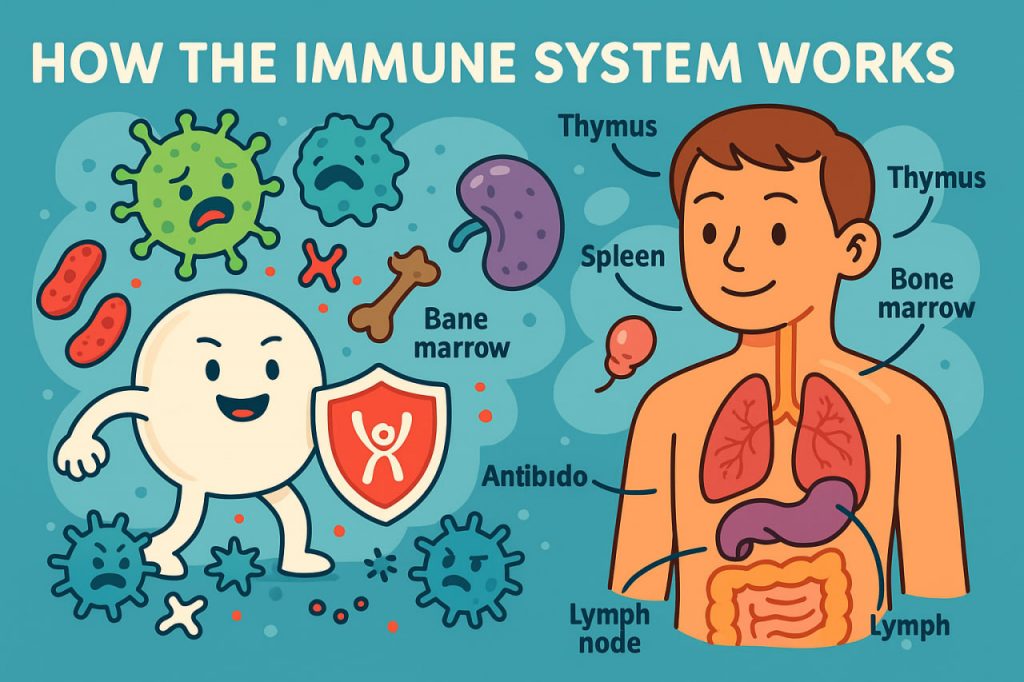The human immune system is a complex network of cells, organs, and molecules that work together to protect the body from infections, viruses, bacteria, and other harmful invaders. It operates silently in the background every second of your life, identifying threats, fighting them off, and remembering them to respond faster in the future.
Two Main Branches of the Immune System
- Innate Immunity (First Line of Defense)
This is the non-specific part of the immune system. It acts quickly and responds to all pathogens the same way.- Includes skin, mucous membranes, stomach acid, and inflammation
- Involves cells like macrophages and neutrophils that attack invaders immediately
- Does not have “memory” of specific pathogens
- Adaptive Immunity (Targeted Defense)
This is the specific part of the immune system. It takes longer to activate but is precise.- Involves T cells and B cells
- Can remember previous invaders through immunological memory
- Produces antibodies that target and neutralize specific pathogens
How the Immune System Fights Infections
- Detection
Pathogens like bacteria or viruses enter the body. The immune system recognizes them as “non-self.” - Response by Innate Immunity
Macrophages and other white blood cells attack the intruders. Inflammation increases blood flow and delivers more immune cells to the area. - Activation of Adaptive Immunity
If the pathogen survives, the adaptive system is triggered. T cells destroy infected cells, and B cells produce antibodies. - Destruction and Cleanup
Antibodies neutralize the pathogen. White blood cells clean up debris and dead cells. - Memory Formation
Memory cells “remember” the invader. If it returns, the body responds faster and stronger.
Key Components of the Immune System
- White Blood Cells (Leukocytes): Patrol the body and attack pathogens
- Lymph Nodes: Filter out harmful substances
- Bone Marrow: Produces immune cells
- Thymus: Where T cells mature
- Spleen: Filters blood and supports immune response
- Antibodies: Proteins that recognize and bind to pathogens
What Weakens the Immune System?
- Poor nutrition
- Chronic stress
- Lack of sleep
- Sedentary lifestyle
- Smoking and alcohol
- Certain medications or chronic illnesses
These factors can reduce the body’s ability to fight infections effectively.
How to Support a Strong Immune System
- Eat a balanced diet rich in vitamins and antioxidants
- Exercise regularly
- Get enough sleep (7–9 hours for adults)
- Manage stress with meditation, hobbies, or therapy
- Stay hydrated
- Practice good hygiene: handwashing and food safety
- Get vaccinated to train your adaptive immunity safely
- Exclude alcohol
- Stop smoking
Conclusion
The immune system is your body’s personal army. It works constantly to keep you safe from invisible threats. Supporting your immunity through healthy habits is one of the best ways to stay strong, energized, and resilient in everyday life.
Glossary
- Pathogen: A harmful microorganism that can cause disease
- Antibody: A protein produced by B cells that targets specific invaders
- T Cell / B Cell: Specialized immune cells involved in adaptive immunity
- Inflammation: The body’s response to injury or infection, marked by redness and swelling


